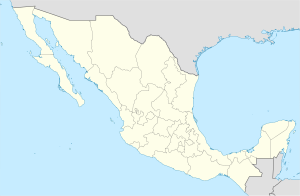Metztitlán
Metztitlán
Otomi: Nziʼbatha | |
|---|---|
Municipality and town | |
 | |
| Coordinates: 20°36′N 98°46′W / 20.600°N 98.767°W | |
| Country | |
| State | Hidalgo |
| Municipal seat | Metztitlán |
| Erection | 6 August, 1824[1][2][3] |
| Government | |
| • Mayor | |
| Area | |
• Total | 814.7 km2 (314.6 sq mi) |
| Population (2005) | |
• Total | 20,123 |
| Time zone | UTC-6 |
| Postal code | 43350 [4] |
| Area code | 774 [5] |
| Website | http://metztitlan.gob.mx/ |
Metztitlán (Otomi: Nziʼbatha) is a town and one of the 84 municipalities of Hidalgo, in central-eastern Mexico. The municipality covers an area of 814.7 km2.
As of 2005, the municipality had a total population of 20,123.[6]
Etymology
[edit]
From Náhuatl Metztli 'moon' and tlan 'place' so its meaning would be: 'Place of the moon'. The town is named after the Aztec moon goddess, Meztli.[7]
History
[edit]Prehistory
[edit]Notable in the prehistory of the local town of Fontezuelas, the Fontezuelas skeleton is a Homo sapiens[citation needed] skeleton initially assumed to be of Pliocene age and thus named Homo pliocenicus by Kobelt (1891). The specimen is a skeleton of unidentified gender standing 1.5 m in height and probably related to the local indigenous peoples. The skeleton was discovered with the overturned carapace of a Glyptodon directly over the specimen, and was most likely placed by other humans. It was named as a new species based on outdated race science, and rigorous descriptions did not find many osteological peculiarities.[8] Many did not accept claims as a distinct taxon as such.[9]
16th century
[edit]Before the Spanish colonization of the region in 1519, Metztitlán was the site of a powerful, independent Otomi state, unconquered by the Aztec Empire. According to Professor Michael E. Smith, this small kingdom's independence was fortified and maintained as a result of the mountainous terrain in the valley surrounding it. Professor Smith wrote that the factors behind the state's enduring independence was due to the fact that "there were few resources of interest to the (Aztec) Empire in this area, and the final emperors may have decided that Metztitlán was not worth the effort."[10]
In April and September 1811, two indigenous revolts occurred in the city, ending in the deaths of 1225 people. The city was elevated to municipality status in 1869.[11]
References
[edit]- ^ Cite error: The named reference
EreccionMunicipiowas invoked but never defined (see the help page). - ^ Cite error: The named reference
History Municipalitywas invoked but never defined (see the help page). - ^ Cite error: The named reference
INAFED-Governmentwas invoked but never defined (see the help page). - ^ Correos de México. "Consulta Códigos Postales". Secretariat of Infrastructure, Communications and Transportation. Retrieved January 17, 2021.
- ^ Telmex. "Consulta de Claves LADA". Mexico Telephones. Retrieved January 17, 2021.
- ^ "Metztitlán". Enciclopedia de los Municipios de México. Instituto Nacional para el Federalismo y el Desarrollo Municipal. Archived from the original on May 27, 2007. Retrieved December 27, 2008.
- ^ "Metztitlán". Municipalities of Hidalgo. Archived from the original on April 8, 2017. Retrieved March 22, 2017.
- ^ Hrdlicka, Ales (2006-03-30). Early Man in South America. Univ Pr of the Pacific. ISBN 978-1-4102-2535-1.
- ^ Schwartz, Jeffrey (2018-01-01). "What's real about humans evolution? Received wisdom, assumptions, and scanarios". Rethinking Human Evolution: 61–92. doi:10.7551/mitpress/11032.003.0006. ISBN 978-0-262-34418-0.
- ^ "History of Mexico - the Aztec Empire".
- ^ "Hidalgo.- Metztitlán". Archived from the original on 2007-05-27.



